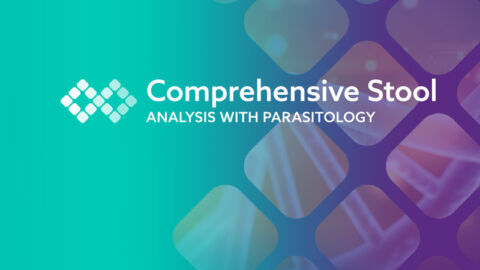Details
Why Conduct a Comprehensive Stool Analysis?
The Comprehensive Stool Analysis + Parasitology (CSAP) is an essential diagnostic tool that enables practitioners to assess the status of beneficial and imbalanced commensal bacteria, pathogenic bacteria, yeast/fungus, and parasites. The identification of pathogenic species and susceptibility testing assists in the selection of the most suitable pharmaceutical or natural treatment agents.
Our Comprehensive Stool Analysis test measures:
- Digestion and absorption of nutrients (Pancreatic Elastase, Muscle Fibers, and Vegetable Fibers)
- Elimination efficiency of undigested food residues and toxins
- Assessment of the gut microbiome, measuring levels of healthy bacterial flora versus potentially pathogenic bacteria species, yeast, and parasites
- Culture and sensitivities of pathogenic yeast and bacteria
- Infectious pathogens (EIA evaluation for Campylobacter, Enterohemorrhagic E. coli cytotoxin, Giardia lamblia, and Cryptosporidium)
- Indices and markers of intestinal immune function (Secretory IgA)
- Indices and markers of inflammation (Calprotectin, Lactoferrin, and Lysozyme)
- Indices and markers of intestinal physiology and of intestinal health (Presence of RBC, WBC, Mucus, Occult Blood, Fecal pH, and Short Chain Fatty Acids)
Efficient remediation of GI dysfunctions involves a comprehensive approach that includes elimination of pathogens and irritants, supplementation of hydrochloric acid, pancreatic enzymes, and pre- and probiotics, and repair of the mucosal barrier.
Learn More About Comprehensive Stool Analysis: Explore FAQs
Analytes
The Comprehensive Stool Analysis measures key markers of digestion, absorption, and intestinal function, including a comprehensive bacteriology and yeast culture, GI pathogens, parasitology, macroscopic appearance, stool chemistries, bacterial susceptibilities and yeast/susceptibilities.
See detailed list of markers below organized by clinically important groups:
- 73 possible species of imbalanced and dysbiotic bacteria
- 4 species of beneficial bacteria
- 48 possible yeast and fungal species
- Yeast
Viruses:
- Adenovirus F40/41
- Norovirus GI/GII
- Rotavirus A
Pathogenic Bacteria:
- Campylobacter (C. jejuni, C. coli and C. lari)
- Clostridioides difficile (Toxin A/B)
- Escherichia coli O157
- Enterotoxigenic Escherichia coli (ETEC) lt/st
- Salmonella spp.
- Shiga-like toxin-producing Escherichia coli (STEC) stx1/stx2
- Shigella (S. boydii, S. sonnei, S. flexneri & S. dysenteriae)
- Vibrio cholerae
Parasites:
- Cryptosporidium (C. parvum and C. hominis)
- Entamoeba histolytica
- Giardia duodenalis (intestinalis & lamblia)
Protozoa:
- Balantidium coli
- Blastocystis spp.
- Chilomastix mesnili
- Dientamoeba fragilis
- Endolimax nana
- Entamoeba coli
- Entamoeba hartmanni
- Entamoeba polecki
- Enteromonas hominis
- Giardia duodenalis
- Iodamoeba bütschlii
- Isospora belli
- Pentatrichomonas hominis
- Retortamonas intestinalis
Nematodes – Roundworms:
- Ascaris lumbricoides
- Capillaria hepatica
- Capillaria philippinensis
- Enterobius vermicularis
- Strongyloides stercoralis
- Trichuris trichiura
- Hookworm
Cestodes – Tapeworms:
- Diphyllobothrium latum
- Dipylidium caninum
- Hymenolepis diminuta
- Hymenolepis nana
- Taenia
Trematodes – Flukes:
- Clonorchis sinensis
- Fasciola hepatica/Fasciolopsis buski
- Heterophyes heterophyes
- Paragonimus westermani
- Yeast
- RBC
- WBC
- Muscle fibers
- Vegetable fibers
- Charcot-Leyden Crystals
- Pollen
Digestion/Absorption:
- Elastase
- Fat Stain
- Carbohydrates
Inflammation:
- Lactoferrin
- Calprotectin
- Lysozyme
Immunology:
Short Chain Fatty Acids:
- % Acetate
- % Propionate
- % Butyrate
- % Valerate
- Butyrate
- Total SCFA’s
Intestinal Health Markers:
Macroscopic Appearance:
Natural Antibacterials:
- Berberine
- Black Walnut
- Caprylic Acid
- Uva Ursi
- Oregano
- Grapefruit Seed Extract
- Silver
Prescriptive Agents:
- Amoxicillin-Clavulanic Acid
- Ampicillin
- Cefazolin
- Ceftazidime
- Ciprofloxacin
- Sulfamethoxazole / Trimethoprim
Natural Antibacterials:
- Berberine
- Caprylic Acid
- Uva Ursi
- Plant Tannins
- Oregano
- Undecylenic Acid
- Grapefruit Seed Extract
Non-Absorbed Antifungals:
Prescriptive Agents:
- Fluconazole
- Itraconazole
- Ketoconazole
Sample Reports
The Comprehensive Stool Analysis test report is a useful resource for practitioner who want to uncover potential causes of gastrointestinal symptoms and chronic systemic conditions.
This test report groups the markers on the Comprehensive Stool Analysis into the following clinically important groups:
- GI Pathogen Profile, Multiplex PCR; stool
- Parasitology; Microscopy
- Stool Chemistries
- Bacterial Susceptibilities to Natural Antibacterials & Prescriptive Agents
Test Prep and Instructions
MosaicDX offers patient-friendly sample collection kits that simplify testing. Our kits include visual, step-by-step instructions for test preparation and sample collection, personalized shipping cards, and pediatric collection bags if needed. With MosaicDX, patients can easily collect samples for testing with confidence and accuracy.












